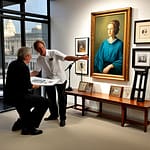Table of Contents
“Professional Artist” is a designation, and it has a specific meaning. Some artists believe that this designation is a bit like sports: you’re an amateur until you develop your skills to the point that you are getting paid (i.e.: start selling your art).
As a professional artist, you will have specialised training and skills in the visual arts (although not necessarily from colleges or universities), be committed to devoting significant time to an artistic activity, and be actively (and successfully) selling your work. However, in my opinion, being a professional artist (or any kind of professional) involves quite a bit more.
To be a professional artist, requires a commitment of time and resources, organisation, attention to detail, treating your art as a business, and actively marketing your exhibitions and finished work to the art-buying public.
Let’s examine some of the characteristics of a professional artist
In short, a professional artist practices art as their profession. If you’re wondering whether you’re a professional artist, or if you’re striving to become one, here are several characteristics that mark a professional artist.
You have an inventory of art ready to exhibit and sell
- For you, art is not a pass-time – you are continually creating more work, and you’re always honing your craft and your artistic voice.
- Your art is well-thought-out, unique, and recognisable. You understand that no piece will ever be perfect, but you are able to decide it’s ready, and move on to the next.
- You know that there’s always more to learn about your technique and your medium, but you don’t let a lack of specific knowledge stop you from moving forward and creating. You believe that the fastest way to learn is to plunge ahead, even if you make mistakes (these are always a learning opportunity). As a professional, you do not spend more time reading about art, or taking classes or workshops, than you do in creating art.
You take an organised, business approach to your art
- You work hard to understand the process of marketing your art – including online. You treat your art as a business, and use standard marketing fundamentals that every entrepreneur uses.
- You understand how your particular art market works – or each of your markets, if you’re in multiple markets. You do this by taking the time and effort to research and understand how to acquire customers and market to them. You don’t assume you already know this, and you don’t try to apply experience from one market to another.
- You have a quality website, and a social media presence. You regularly take part in exhibitions, and you always display your work professionally, and in an appealing manner.
- You’ve expended the time, effort, and money to create professional marketing materials to showcase your work and your experience. You have a good photograph of yourself (profile photo), plus quality photos that are a representative sampling of your art. You have a short résumé and an artist statement ready to go.
- When you are in attendance at an exhibition of your work, you engage with visitors and actively sell yourself and your work. You have professionally printed business cards, and you hand these out at exhibitions. You get contact information from prospective buyers to build your mailing list.
- You post on social media, and send promotional materials to your mailing list to publicise all the shows and exhibitions in which you take part. You also email your list when you create a new piece.
Your work is priced rationally
- You know how to price your work so that you’re competitive in the market in which you are selling it. You use consistent pricing based on an established pricing policy. There’s logic to your pricing, and this logic is clear to your potential buyers.
You involve yourself with other artists
- You take part in collective exhibitions, and are a member of local artist organisations. You try to engage with other artists, and take every opportunity to look at other people’s work. You solicit feedback on your art from other artists and from art buyers. You support and promote your fellow artists.
Conclusion
A professional artist makes their living from art. They take their art and their art career seriously, treat it like the business it is, and vigorously promote and market their art.
If this doesn’t describe you, or if you think that treating art as a business somehow demeans your art, or if you lack the characteristics listed above, you are an art hobbyist. There is nothing wrong with this, and you might be a moderately successful hobbyist who sells a few pieces.
Retirement
When most people retire, they stop doing what they did when they worked, and take up more relaxing activities such as travel or golf (or even art!).
Professional artists are different. Art is something that exists deep within one’s soul, and cannot be easily abandoned. The majority of professional artists continue with art in retirement – many never retire! They might slow down, and their output might drop, but they continue to produce art, exhibit it, and actively market it.
There are also those people who retire from a non-art career, and take up art as a hobby. If this is you, you might eventually become a professional artist in retirement if you practice and achieve all the prerequisites needed to become a professional artist.




